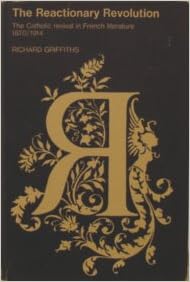The Reactionary Revolution: The Catholic Revival in French Literature 1870-1914 by Richard M Griffiths, 362 pages
 The
four decades preceding the outbreak of the First World War saw a
phenomenon in French literature that would have seemed unthinkable only a
short time before - a series of remarkable writers who embraced the
Catholic faith and celebrated their identity as Catholics. Authors
including JK Huysmans, Leon Bloy, Paul Claudel, and Charles Peguy
rejected both the materialist "naturalism" of writers like Emile Zola
and Guy de Maupassant and the diabolism of the Decadents.
The
four decades preceding the outbreak of the First World War saw a
phenomenon in French literature that would have seemed unthinkable only a
short time before - a series of remarkable writers who embraced the
Catholic faith and celebrated their identity as Catholics. Authors
including JK Huysmans, Leon Bloy, Paul Claudel, and Charles Peguy
rejected both the materialist "naturalism" of writers like Emile Zola
and Guy de Maupassant and the diabolism of the Decadents.
In their rebellion against modernity, the
authors considered in this book took an inward turn, stressing the
otherness and hard doctrines of Catholicism, romanticizing the Middle
Ages as a contrast to the debased present. Their writing is marked by
an odd anti-intellectualism even as it overlapped with the beginning of
the Neo-Thomist revival, as well as an unfortunate propensity for
violent rhetoric and sympathies with nationalist political movements.
Their particular brand of extremism repudiated every form of compromise
as it sought to inspire believers to ever greater levels of zeal, it
rejected also every form of sentimentalism in this quest for holiness.
If many of the particular preoccupations of the revivalists seem strange
today, their writings nonetheless served as inspiration to later
writers such as Francois Mauriac, Georges Bernanos, Sigrid Undset, Graham Greene,
Evelyn Waugh, Flannery O'Connor, and Walker Percy.
This book is worth reading for anyone interested in the authors or in the period. The description of obscure ancillary figures such as Abbe Boullan is invaluable, and particularly benefits from Griffiths' sensitivity to the limits of Catholic orthodoxy. Frequent, large chunks of untranslated French do pose a substantial (but not insurmountable) barrier for those who (like me) are not fluent in French, however.
No comments:
Post a Comment